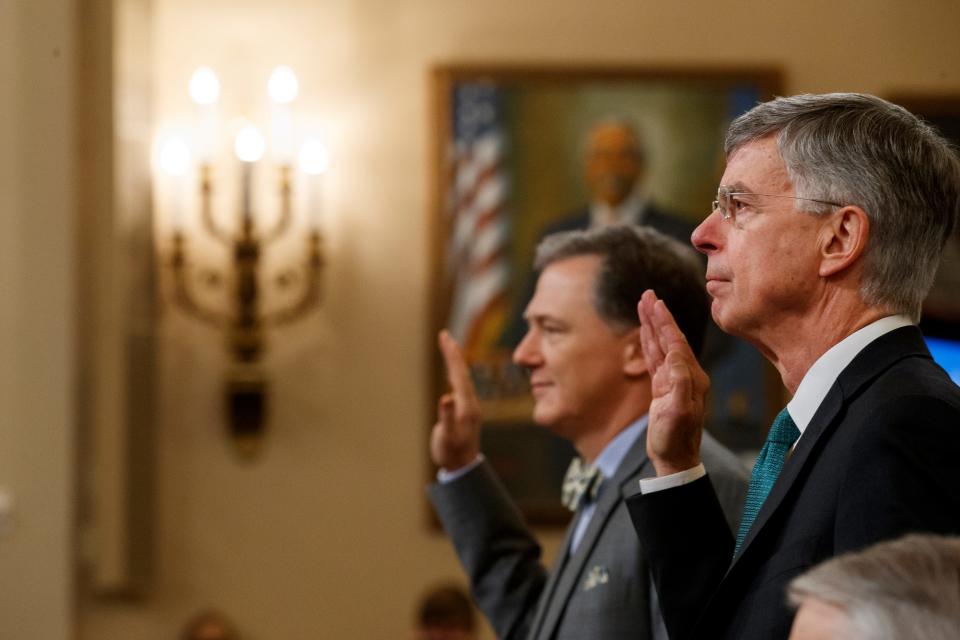Trump impeachment hearings confirm 'no quid pro quo' defense is a lie
President Donald Trump has insisted dozens of times, most recently on Wednesday, that his dealings with Ukraine this summer were not a "quid pro quo." After the opening day of public testimony in the House impeachment hearings, does anyone really believe that anymore?
Actually, the Latin phrase quid pro quo (something for something) was always too lofty an expression — and too feeble, frankly — to capture the import of Trump's actions. What Americans heard for themselves during the nationally televised hearings on Wednesday sounds more like a shakedown.
The "something" Trump wanted was a publicly announced foreign investigation into potential political rival Joe Biden and Ukraine's purported involvement in the 2016 election. The "something" Ukrainian President Volodymyr Zelensky wanted was a White House meeting and hundreds of millions of dollars in military aid.
Put simply, arms for dirt. Quid meet quo. An abuse of power. Perhaps even extortion.
'For a domestic political campaign'
"Withholding (nearly $400 million in) security assistance in exchange for a domestic political campaign in the United States would be crazy," leadoff witness Bill Taylor, America's highest-ranking diplomat to Ukraine, said of Trump's actions.
As Taylor and fellow career diplomat George Kent recounted, Ukraine was ripe for the squeezing. The former Soviet republic in eastern Europe is locked in a life-and-death struggle with Russia, which had seized Crimea from Ukraine in 2014 and supported a separatist uprising that has claimed the lives of more than 13,000 Ukrainian troops.

REP. ANDY BIGGS: When impeachment proof falls short, Democrats shift goal posts
In April, Ukrainians overwhelmingly elected the 41-year-old Zelensky, a popular comic actor running as an anti-corruption crusader who would end the war. He was desperate to show the world, and Moscow, close ties with Washington by meeting with Trump in the Oval Office. And Zelensky's military was in dire need of the aid — what would amount to 10% of Ukraine's defense budget — that the U.S. Congress had approved.
In the now-infamous July 25 phone call with Trump, Zelensky first thanked the American president for the promise of security aid and pushed for a White House meeting. But Trump wanted something as well. "I would like you to do us a favor, though," he responded, according to a rough transcript of the call. The favor had nothing to do with U.S. security and everything to do with his self-interest in getting reelected in 2020. Trump urged Zelensky to confer with his personal attorney, Rudy Giuliani, who was leading a shadow foreign policy pressing for both investigations.
In Wednesday's most significant new revelation, Taylor testified that the very next day, a staffer overheard Trump talking to Gordon Sondland, the U.S. ambassador to the European Union. Sondland told the staffer that Trump cared less about Ukraine than about the investigations into Biden and his son Hunter.
Ginning up investigations
Kent made it clear he was appalled by Giuliani's "irregular" campaign "to gin up politically motivated investigations."
And as the summer dragged on, Taylor testified, "I had heard that the security assistance, not just the White House meeting, was conditioned on the investigations." Trump, he was told, viewed the whole enterprise through the lens of a businessman writing a check for services rendered: "If that person owed him something, before he signed the check, he was going to get whatever was owed to him.”
Something for something.
It very nearly worked. Faced with the existential threat of losing crucial military aid, Zelensky prepared to announce the investigations on CNN. But Trump's scheme was leaking out. A whistleblower's tipoff was winding its way to Congress. House committees were launching investigations. There were bipartisan demands to free the money. The White House relented Sept. 11.
"It's a rancorous story," Taylor, a West Point graduate and a veteran of the Vietnam War, summarized Wednesday, "about whistleblowers, Mr. Giuliani, side channels, quid pro quos, corruption and interference in elections."
Trump's defenders can argue that the aid was ultimately released and that Zelensky claimed not to have felt pressured. They can argue that the president's conduct doesn't warrant impeachment. They can argue that the voters, not Congress, ought to determine the president's fate. But to claim there was no quid pro quo is a flat-out lie.
USA TODAY's editorial opinions are decided by its Editorial Board, separate from the news staff. Most editorials are coupled with an opposing view — a unique USA TODAY feature.
To read more editorials, go to the Opinion front page or sign up for the daily Opinion email newsletter. To respond to this editorial, submit a comment to letters@usatoday.com.
If you can't see this reader poll, please refresh your page.
What do you think of our view on the public impeachment hearings?
This article originally appeared on USA TODAY: Trump impeachment hearings confirm 'no quid pro quo' defense is a lie

